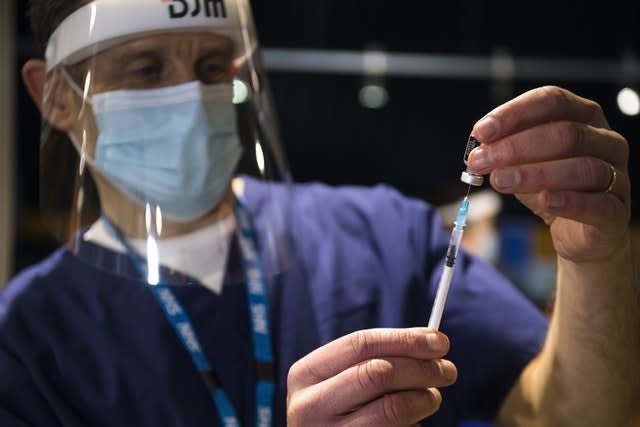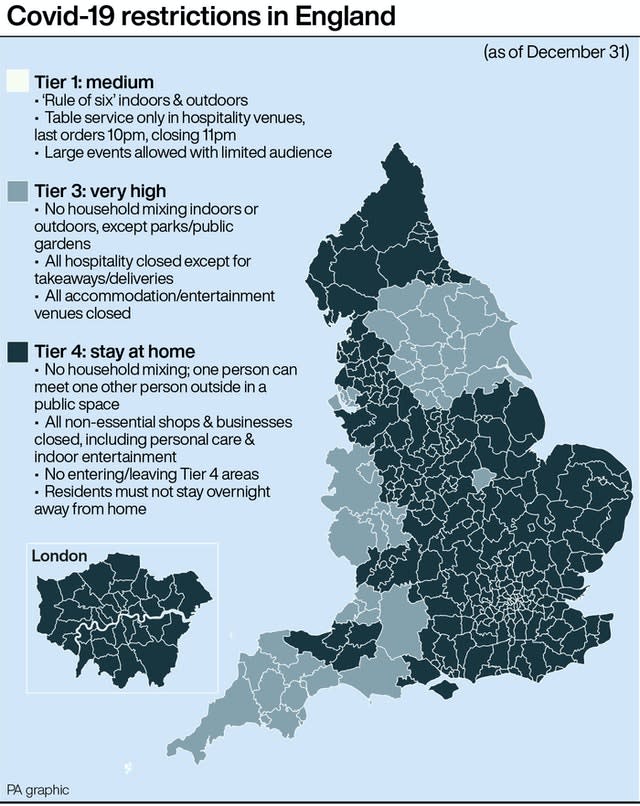Senior medic warns of burnout fears for NHS staff at Covid ‘battle stations’
Emergency healthcare staff at “battle stations” amid the rising number of coronavirus patients are at risk of burnout, a senior medic has warned.
Adrian Boyle, vice president of the Royal College of Emergency Medicine, said people were “tired, frustrated and fed-up”, while Saffron Cordery, deputy chief executive of NHS Providers, said the next few weeks would be “nail-bitingly difficult for the NHS”.
Dr Boyle told BBC Breakfast: “What is it going to be like over the next couple of months? I don’t know, I am worried.
“We are very much at battle stations.
“There will be short-term surges of morale but people are tired, frustrated and fed-up, as everybody is, whether they work in hospital or not.
“The people who go into emergency medicine expect it to be tough from time to time.
“There is a real worry about burnout.”
His comments come as the Royal College of Nursing’s England director, Mike Adams, said that staff leave was being cancelled to deal with the surge in demand.

Mr Adams also told Sky News the expectation of a mass rollout in capacity through the Nightingale hospitals was “misplaced”.
He added: “If we are having to cancel leave to staff these areas, the obvious question is where will the staff come from to open the Nightingales?
“I am sure there will be moves to open some beds, there are some beds open in different Nightingale hospitals in different areas of the country.
“I have real concerns that the expectation that this mass rollout in capacity can happen is misplaced because there aren’t the staff to do it.”
New Year’s Eve brought a new record high of 55,892 daily lab-confirmed cases in the UK – the highest since mass testing began in late May – with a further 964 deaths within 28 days of a positive test.
A British Medical Association (BMA) survey also found that 67% of doctors reported that current levels of fatigue and exhaustion were higher than normal as they tackle a mounting second wave and a growing backlog of care on top of the usual seasonal demand.

While more than a million people have now received their first coronavirus vaccination, a joint statement from England’s Professor Chris Whitty and the chief medical officers of Scotland, Wales and Northern Ireland said the public would “understand” and “thank” them for a plan to give first jabs as a priority, delaying the follow-up vaccination for others.
The deployment of the newly approved Oxford/AstraZeneca vaccine will begin on Monday, almost a month after the rollout of the Pfizer/BioNTech vaccine, but second doses of either will now take place within 12 weeks rather than 21 days as initially planned.
Professor David Salisbury, a former director of immunisation at the Department of Health, said he backed the revised Covid-19 vaccine strategy.
The associate fellow at the Chatham House think tank told BBC Radio 4’s Today programme: “Of course I accept it is inconvenient and isn’t helpful to have to change appointments and explain to people (about the delay in receiving a second jab) but the reason for doing this is to save lives.
“We know how many have been vaccinated, and across the whole country it isn’t all that many, but every time we give a second dose right now, we are holding that back from someone who is likely, if they get coronavirus, to die, and much more likely to die than somebody who has already had a single dose.”

Figures published on New Year’s Eve show just less than a third of acute trusts have more Covid-19 patients than at any point since the pandemic began, with union leaders warning about staff burnout, soaring sickness levels and “intolerable” pressures.
The situation is dire in Northern Ireland, where bed occupancy in the health service is now at 100%, with ambulance crews braced for long delays.
All of mainland Scotland and Skye remained under the highest curbs as 2021 began.
Police forces and public health officials across the UK pleaded with people to celebrate the new year with their own household.
Ken Marsh, chairman of the Metropolitan Police Federation, said New Year’s Eve was “quite quiet” in London, where Tier 4 restrictions meant that most places are closed.
He told BBC Breakfast: “I think the public have really cottoned on that this is really serious, the position that we are in, and we did not see the numbers we thought we would.”

 Yahoo Finance
Yahoo Finance 